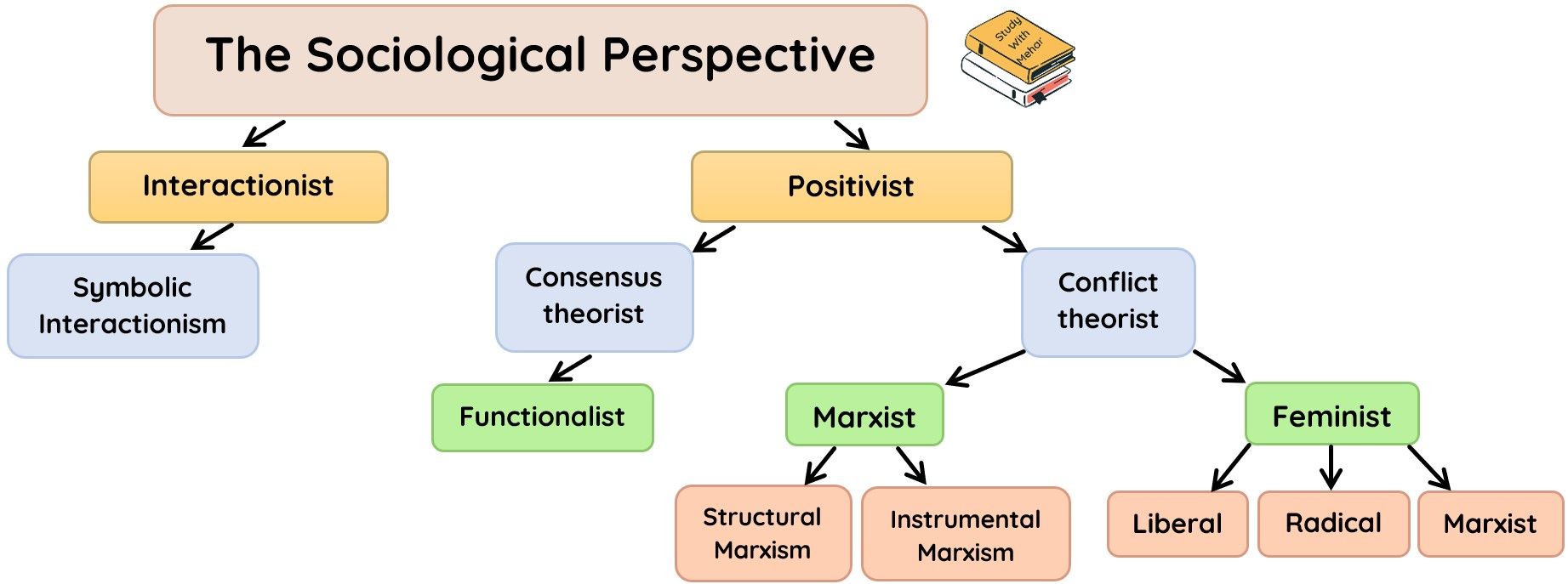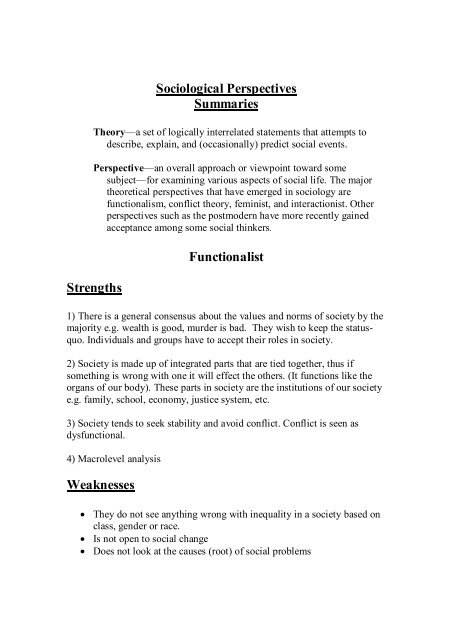Imagine a bustling city, a symphony of movement, with cars rushing along avenues, people rushing in and out of buildings, and businesses humming with activity. It seems chaotic at first glance, yet beneath the surface, an intricate order exists. This order, this sense of stability, is what the functionalist perspective in sociology attempts to understand. It’s a powerful lens through which we can analyze how different parts of society work together, ensuring not just survival, but also a sense of unity and shared purpose.

Image: www.studywithmehar.com
The functionalist perspective, also known as social functionalism, views society as a complex system comprised of interconnected parts, each with a specific function that contributes to the overall stability and well-being of the whole. It’s like a well-oiled machine, where each gear, spring, and lever plays a crucial role in its operation. From our daily interactions to the vast network of institutions, everything has a purpose, a role to play in maintaining social order and equilibrium.
A Historical Journey: From Comte to Parsons
The roots of functionalism can be traced back to the 19th century, with the writings of Auguste Comte, the “father of sociology.” Comte believed that society operates according to scientific laws, just like the natural world, and that social phenomena could be studied systematically. He emphasized the importance of social order and stability, suggesting that society’s institutions, like government, religion, and family, played a vital role in maintaining this balance.
This philosophy was further developed by Émile Durkheim, a prominent figure in the development of sociology. Durkheim argued that societies are held together by shared values, beliefs, and practices, which he termed “collective conscience.” This collective conscience provides moral guidance and a sense of belonging, binding individuals together and fostering social cohesion. He famously studied the phenomenon of suicide, observing its higher rates in societies with weakened social bonds, further highlighting the importance of functional social structures.
In the 20th century, the functionalist perspective gained immense popularity with the work of Talcott Parsons, a leading figure in American sociology. Parsons developed a highly influential theory that emphasized the interconnectedness of social institutions, arguing that they are interdependent and work together to ensure the smooth functioning of society. He proposed a “systems model,” where social systems adapt to their environments by fulfilling certain basic needs – adaptation, goal attainment, integration, and latency – thus maintaining stability and continuity.
Key Concepts: Building Blocks of the Perspective
The functionalist perspective is grounded in a set of core concepts that guide its analysis:
- Social Structure: This concept refers to the patterned ways in which individuals interact with each other and the established institutions within society. These patterns, like family structures, educational systems, and economic organizations, create stability and predictability in social life.
- Social Functions: Every institution and social action, according to functionalism, fulfills a specific function for society. The family provides emotional support and socialization of new members. The economy produces goods and services to meet basic needs. The government maintains order and enforces laws.
- Manifest and Latent Functions: Manifest functions are the intended and recognized consequences of social institutions or actions. For example, the manifest function of education is to provide knowledge and skills. Latent functions, on the other hand, are unintended and often unrecognized consequences. Education, for instance, also serves to socialize students into societal norms and values, fostering a sense of community and shared culture.
- Dysfunctions: While functionalism emphasizes order and stability, it also acknowledges that social structures can sometimes have negative consequences. These dysfunctions disrupt the smooth operation of society, leading to social problems like crime, poverty, and inequality. For example, an educational system that perpetuates inequality can lead to social unrest and instability, hindering the overall functioning of society.
Applications in Real Life: Understanding Social Issues
The functionalist perspective provides a valuable framework for understanding how different parts of society function and interact. It helps us analyze social issues from a macro perspective, looking at their broader impact on the social system. Here are some examples:
- Education: Functionalists view education as a crucial institution that prepares individuals for their roles in society. It transmits knowledge and skills, socializing students into accepted norms and values, and fosters social cohesion. However, functionalists also acknowledge the potential dysfunctions of the education system, such as inequality and educational disparities, which can negatively impact social stability.
- Family: The family is seen as the primary unit of socialization, teaching children basic social skills and values. It provides emotional support and care, ensuring the continuation of society through the birth and rearing of new generations. Functionalists recognize the changing nature of families in modern society, with its growing diversity in forms, but still emphasize its fundamental role in maintaining social order.
- Religion: Functionalism views religion as a powerful force that provides moral guidance, a sense of belonging, and cultural unity. It offers comfort and meaning in times of uncertainty, promotes social solidarity, and reinforces social norms. However, functionalists also acknowledge the potential for conflict and dysfunctions within religious institutions, especially when religious beliefs clash with societal norms or when religious groups use their power for self-interest.
- Crime: While crime is seen as a dysfunction, functionalists argue that it can also serve a purpose by reinforcing societal norms and values. When criminal behavior is punished, it reaffirms the boundaries of acceptable behavior. Furthermore, crime can lead to social change by highlighting social problems and prompting reforms.

Image: www.yumpu.com
Expert Insights: Functionalism and its Criticisms
While the functionalist perspective offers a valuable framework for understanding society, it has also been subjected to significant criticisms. Some critics argue that it is overly focused on stability and order, neglecting the role of conflict, power, and inequality in shaping social life. They point out that functionalism often justifies existing social arrangements, even those that perpetuate inequality, by emphasizing their contribution to social stability.
Yet, the functionalist perspective remains a crucial tool for sociologists, offering a distinct lens through which to examine complex social phenomena. It highlights the interconnectedness of different parts of society, emphasizing the importance of social institutions in maintaining order and stability. By understanding how these institutions function and interact, we can gain better insights into the dynamics of social life, identify potential problems, and work towards creating a more just and equitable society.
Functionalist Sociological Perspective
Applying Functionalism to Your Own Life
You can apply the principles of functionalism in your own life by:
- Recognizing the Interconnectedness: Become aware of how different aspects of your life are interconnected. What are the roles and functions of your family, your community, and your workplace? How do these institutions shape your experiences and contribute to society as a whole?
- Understanding the Social Functions of Your Actions: Consider the intended and unintended consequences of your actions. How do your choices impact those around you and contribute to the larger social system?
- Identifying and Responding to Dysfunctions: Be aware of social issues and problems that undermine the smooth functioning of society. Recognize the role of conflict and inequality, and consider how you can contribute to promoting solutions and creating a more just and balanced world.
In Conclusion:
The functionalist perspective provides a powerful framework for understanding the complexity of social life. By focusing on the interconnectedness of institutions and the role they play in maintaining social order, it offers a valuable lens for analyzing social issues and charting paths towards a more just and equitable society. As you navigate the complexities of life, consider the perspectives of functionalism to gain a deeper understanding of the intricate web of social relationships that shape our daily lives. Continue to explore the diverse perspectives within sociology, engaging in respectful dialogue and seeking solutions that promote social harmony and progress for all.





